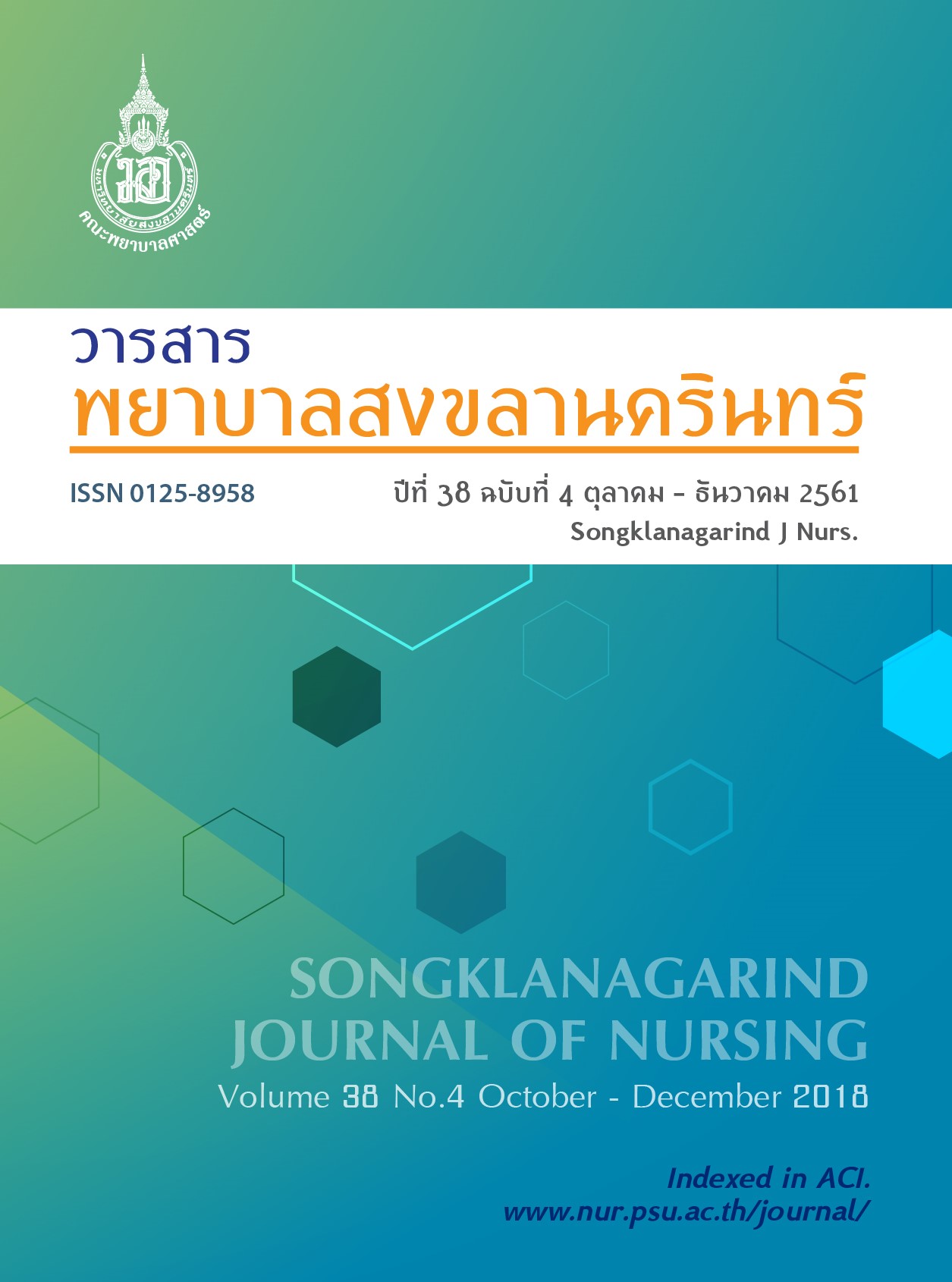Comparison of Knowledge, Health Belief, and Perceived Self-Efficacy Between Female Students Who Performed and Did Not Perform Breast Self-Examination
Main Article Content
Abstract
The objective of this descriptive study was to compare knowledge, health belief and perceived selfefcacy of female students, participating in the program developed based on the concept of “Health Belief Model (HBM)” to promote breast self-examination (BSE), who performed and did not perform breast selfexamination (BSE). Two hundred and seventy eight students who voluntarily participated in the program with 1-year follow up were purposively recruited. The instruments used in data collection were Knowledge test with KR 20= .88, and Questionnaires concerning health belief and perceived self-efcacy with Cronbach’s coefcient alpha = .72 and .92 respectively. The data were collected by self-administered and analyzed using descriptive statistics and Mann Whitney U test.
The results shown 87 (27.23%) students performed BSE and 191 (72.77%) students did not perform BSE. The mean rank of knowledge, health belief including perceived susceptibility, perceived benefts and perceived self-efcacy of the students who performed BSE were signifcantly higher (p< .01), whereas perceived barrier was signifcantly lower than those who did not performed BSE (p< .001). The researcher offers recommendations for promoting the breast self-examination program activities among female students to ensure long-lasting behavior change including periodic reminder, since the students are generally healthy they may not pay enough attention to regular BSE. In addition, modify the activities by using suitable social media platforms to increase knowledge, perceived susceptibility, perceived benefts and perceived self-efcacy while decreasing the perceived barrier to BSE are also sugested
Article Details
References
2. World Health Organization. Global health estimates 2016: Deaths by cause, Age, Sex, by Country and by Region, 2000-2016 [Internet]. Geneva: World Health Organization; 2018 [cited 2018 Jun 10]. Available from: http://www.who.int/healthinfo/global_burden_disease/estimates/en/.
3. World Health Organization. Projections of mortality and causes of death, 2015 and 2030 [Internet]. Geneva: World Health Organization; 2018 [cited 2018 Jun 10]. Available from: http://www.who.int/healthinfo/global_burden_disease/
projections/en/.
4. Zainal Ariffin O, Nor Saleha IT. National cancer registry report malaysia cancer statistics-Data and figure 2007 [Internet]. Malaysia: Ministry of Health; 2011 Feb [cited 2018 Jul 1]. Available from: http://www.care.upm.edu.my/dokumen/
13603_NCR2007.pdf
5. Kim JH, Menon U, Wang E, et al. Assess the effects of culturally relevant intervention on breast cancer knowledge, beliefs, and mammography use among Korean American women. J Immigr Minor Health. 2010;12(4):586-97. doi:10.1007/
s10903-009-9246-7
6. The American Cancer Society medical and editorial content team. Breast cancer survival rates [Internet]. Georgia: American Cancer Society; 2017 [revised 2017 Dec 20; cited 2018 Jun 29]. Available from: https://www.cancer.org/cancer/breast-cancer/understanding-a-breast-cancerdiagnosis/breast-cancer-survival-rates.html
7. Healthcare information group. Public Health Statistics A.D.2016 [Internet]. Nonthaburi: Strategic and planning division, Office of the Permanent Secretary, Ministry of Public Health; 2016 [Cited 2018 Jun 10]. Available from: http://bps.moph.go.th/new_bps/sites/default/files/health_strategy2559.pdf. Thai.
8. Akhtari-Zavare M, Latiff LA, Juni MH, Said SM, et al. Knowledge of female undergraduate students on breast cancer and breast self-examination in klang valley, Malaysia. Asian Pac J Cancer Prev. 2015;16(15):6231-5. doi: 10.7314/APJCP.2015.16.15.6231
9. Birhane K, Alemayehu M, Anawte B, et al. Practices of breast self-examination and associated factors among female debre berhan university students. Int J Breast Cancer. 2017 May 17;2017:Article ID 8026297 [6 p.]. doi:10.1155/2017/8026297
10. Didarloo A, Nabilou B, Khalkhali HR. Psychosocial predictors of breast self-examination behavior among female students: an application of the health belief model using logistic regression. BMC Public Health. 2017;17(1):861-8. doi:10.1186/s12889-017-4880-9
11. Jose S. A Pre experimental study to determine the effectiveness of video assisted teaching on knowledge breast self-examination among B. Sc. nursing students in a selected nursing college of Indore city. International Journal of Advanced Research. 2016;4(9):640-3. doi:10.21474/IJAR01/1529
12. Yong NT, Soon LK. The effects of educational intervention on knowledge and practice of breast self-examination among female college students. IJPHCS. 2017;4(6):120-31.
13. Chinpatanapongsa E, Suwanpatikorn K. The study of relationship between perceived benefit, perceived barrier, perceived self-efficacy and breast self examination behavior in nursing students. J Public Health Nurs. 2014;28(3): 14-29. Thai.
14. Erbil N. Health beliefs and breast self-examination among female university nursing students in Turkey. Asian Pac J Cancer Prev, 2014;15(16): 6525-6529. doi:10.7314/APJCP.2014.15.16.6525
15. Moussa MM, Shalaby NS. Effect of breast selfexamination education program on knowledge, attitude, and practice of nursing students. Int J Res Stud Biosci (IJRSB). 2014;2(6):40-9.
16. Alsaraireh A, Darawad MW. Impact of a Breast Cancer Educational Program on Female University Students’ Knowledge, Attitudes, and Practices. J Canc Educ. 2017;1-8. doi:10.1007/s13187-017-1304-6
17. Rosenstock IM, Strecher VJ, Becker MH. Social learning theory and the health belief model. Health Education Quarterly. 1988;15(2):175-83.
18. Pakdevong N, Binhosen V, Komonwipast N. Relationship between risk factors to breast cancer, knowledge and breast self-examination of female students in higher education [Research report]. [Pathumthani]: Rangsit University; 2017. 120 p. Thai.
19. Bandura, A. Self-efficacy the exercise of control. New York: W.H. Freeman and Company, 1997.
20. Norwood, S.L. Research strategies for advanced practice nurses. New Jersey: Prentice Hall Health, 2000.
21. Tumwijit S, Rastsadondee K, Boonrod N. Factors influencing practice of breast self-examination behavior among female undergraduate students of Bangkok Thonburi University. J Public Health Nurs. 2009;21(3):83-96. Thai.
22. Kifle MM, Kidane EA, Gebregzabher NK, Teweldeberhan AM, Sielu FN, Kidane KH, Weldemenkerios SH, Tesfay MG. Knowledge and practice of breast self-examination among female college students in Eritrea. AJPHR. 2016; 4 (4):104-8.


